
Related
Topics
Guests
- Robert Rabinlongtime activist and founding member of the Committee for the Rescue and Development of Vieques. He spent six months in prison for participating in the mass civil disobedience campaign that helped pressure the U.S. Navy to end its bombing exercises in Puerto Rico.
- Rep. José Serranoone of Congress’s most vocal critics of the actions of the U.S. military in Vieques. He represents the 15th Congressional District of New York. He was born in Mayagüez, Puerto Rico.
Links
- Roots Action: Provide adequate resources to address the health crisis in Vieques and fully clean up the island
- See Democracy Now! coverage of the Vieques bombing/activism
- U.S. Rep. José E. Serrano
- "How a People's Movement Stopped the Bombing in Vieques." (Fellowship of Reconciliation)
- "Unexploded Bombs Litter Waters of Vieques, Puerto Rico, a Decade after the U.S. Navy Ceased Target Practice" By Juan González (
On the Puerto Rican island of Vieques, thousands are commemorating the 10th anniversary of when the U.S. Navy stopped using their home as a bombing range. Since the 1940s, the Navy used nearly three-quarters of the island for bombing practice, war games and dumping old munitions. The bombing stopped after campaign of nonviolent civil disobedience, but the island continues to suffer. At the current cleanup rate, the Navy says, it will take until 2025 to remove all the environmental damage left by more than 60 years of target practice. A fisherman recently discovered a giant unexploded bomb underwater. The island of about 10,000 people also lacks a hospital to treat illnesses such as asthma and cancer that may be attributed to the military’s former bombing activity. “We believe the military is really not interested in cleaning up Vieques and rather interested in continuing to punish Vieques for having thrown the U.S. Navy out in 2003,” says Robert Rabin of the Committee for the Rescue and Development of Vieques. “This is a process that we believe is happening with no real supervision, no genuine community participation.” We also speak to Rep. José Serrano of New York, a native Puerto Rican.
Transcript
JUAN GONZÁLEZ: We turn now to Vieques, the tiny island off the eastern coast of Puerto Rico where thousands are commemorating the 10th anniversary of when the U.S. Navy stopped using their island as a bombing range. Since the 1940s, the Navy used nearly three-quarters of the island for bombing practice, war games and dumping of old munitions. Resistance to the bombing reached a turning point in 1999 when a Marine pilot missed his target and dropped two 500-pound bombs that killed a civilian security guard. A campaign of nonviolent civil disobedience eventually forced the Navy to close the facility. This is how Democracy Now! reported on the end of the bombing on May 1st, 2003, when we spoke with Rosa Clemente, then a reporter for Free Speech Radio News.
ROSA CLEMENTE: It was an exciting and a joyous moment for the people of Vieques, Puerto Rico, but I think for all the people who struggled, wherever those people may be, to get the U.S. Navy to leave, and for people all over the world to see a victory and to claim that victory. So it was an amazing moment, and there were thousands upon thousands of people from all over the world that were there celebrating with the people of Vieques, Puerto Rico.
But with that celebration, there’s also a caution. And that caution, I think, comes from the transfer of the land to the U.S. Department of Interior as opposed to giving the land back to the people of Vieques and, in an essence, giving the people of Vieques their reparations. And those reparations need to come by giving the people back their land and also by the U.S. government doing intensive, massive cleanup of the land, that has depleted uranium, napalm, and God knows what other contaminants that continue to kill the people, and particularly in Vieques, Puerto Rico.
AMY GOODMAN: That was May 1st, 2003. Well, 10 years later, Vieques continues to suffer from a slow cleanup process. The island of about 10,000 people also lacks a hospital to treat illnesses such as asthma and cancer, that many attribute to the military’s former bombing activity.
For more, we’re joined here in New York by Congressmember José Serrano, who has been one of the Congress’s most vocal critics of the actions of the U.S. military in Vieques. He represents the 15th Congressional District of New York in the Bronx, born in Mayagüez, Puerto Rico.
And joining us from Vieques via Democracy Now! video stream is Robert Rabin, longtime activist, founding member of the Committee for the Rescue and Development of Vieques, spent six months in prison for participating in the mass civil disobedience campaign that helped pressure the Navy to end its bombing exercises.
Robert, let’s start with you in Vieques. What’s happening today on this 10th anniversary of the successful campaign to stop the U.S. Navy bombing it?
ROBERT RABIN: Buenos días, Amy. Good morning.
Today we are celebrating and remembering and reorganizing the forces here in Vieques. We’re remembering an enormous victory, May 1st, 2003. The people of Vieques and the Puerto Rican nation, in the archipelago and in the diaspora, with help from thousands of people throughout the world, peace-loving people, without firing a single shot, defeated the most powerful military force in history.
But 10 years later, we continue to suffer the effects of the toxic legacy—highest cancer case rates in all of Puerto Rico. Vieques is a small, poor island with no hospital, serious problems, economic and social problems. So, we are, again, remembering this enormous victory but still struggling to make—pressure the government in Puerto Rico and the federal government to be responsible for the horrific ecological and health disaster created by half a century of U.S. military activity here.
JUAN GONZÁLEZ: And, Robert, I want to ask you about the cleanup. In my column in today’s Daily News, we run a picture of an undetonated bomb that was found by fishermen recently in 80 feet of water off of Vieques. The military says it’s spent already about $180 million, the most expensive cleanup in its history. But yet, so much of the waters are still contaminated with all of these unexploded munitions. Your sense of how that cleanup has been going?
ROBERT RABIN: I would suggest that most of that almost $200 million has ended up in the bank accounts of large U.S. corporations hired by the Navy to do the cleanup. While the cleanup is taking—has taken over 10 years so far, they’re only scratching the surface. This is a process that we believe is happening with no real supervision, no genuine community participation. We believe the military is really not interested in cleaning up Vieques, and rather interested in continuing to punish Vieques for having thrown the U.S. Navy out in 2003. So we need to continue to pressure and get the support from congressmen, like Congressman Serrano, Nydia Velázquez and Luis Gutiérrez, and now also Congressman Alan Grayson from Florida, have taken up this issue to help push the federal government to be responsible for the ecological destruction done on Vieques as well as helping with the severe health crisis that resulted from these—from military toxics.
JUAN GONZÁLEZ: And, Congressman Joe Serrano, what about the cleanup? You have been lobbying fiercely in Congress to get the money, but Robert Rabin is saying some of that money is being wasted and is not really doing the job.
REP. JOSÉ SERRANO: Well, absolutely. Robert has a key word here that I was going to use, and he used it first, which is “punishment.” I really saw, I believe, the first couple of years after that May 1st 10 years ago, that there was a resentment, and by members of Congress, sort of “How dare you defeat the military? How dare you push us out?” and in the administration. And so it was very hard to get dollars. In fact, we didn’t cry over it, but I think the closing of Roosevelt Roads was also sort of a punishment. “Oh, yeah? Well, you want that closed? Well, we’re going to close this one that has jobs and so on involved with it.” And so, this—
JUAN GONZÁLEZ: Both Roosevelt Roads and Fort Buchanan, right?
REP. JOSÉ SERRANO: Exactly. So there’s been that sense: “How dare you do it?” Then there is the fact that in this country, and perhaps throughout the world, 10 years becomes a long time, and people forget that there’s a loss of memory of what happened there. My understanding, yesterday I learned that less than 5 percent of the munitions have been removed. So we continue to push in the Appropriations Committee, where I sit. We continue to push the administration. But there is a new emphasis now. I’m seeing a new mobilization, similar to what I saw 10 years ago or 15 years ago, to say, “OK, now the cleanup has to really take a serious role here.”
AMY GOODMAN: What about the issue of cancer? There was a study by Dr. Jorge Colón of the University of Puerto Rico that was based on hair samples of the people of Vieques. He found 34 percent of the population, about a third, had toxic levels of mercury, 55 percent contaminated with lead, 69 percent with arsenic, 69 percent with cadmium, 90 percent with aluminum and antimony, whose toxic effects are similar to arsenic poisoning. These are all substances found in the ordnances used on the island, the bombs.
REP. JOSÉ SERRANO: Right, and that was something that the activists in Vieques were saying prior to the Navy getting out, the fact that under the American flag there was no place that had such a high incidence of cancer. And then there was the correlation—or the lack of it—between the fact that the larger island of Puerto Rico did not have the same rate as Vieques did. So, obviously there’s a relationship. But when you’re talking to the military, the military, you know, sort of at times wants to run its own country, its own world, and just refuses to understand or react to what we want, which is an immediate cleanup and a commitment. Yesterday we spoke to the EPA folks, and they told us that the dedication is of $20 million a year. Well, $20 million of a fund, then for Vieques to participate in that fund—no, we need a dedicated amount from the administration for Vieques, and that’s what we’re pushing for.
JUAN GONZÁLEZ: And does the cleanup include the oceans as well as the land? Because so far all of the cleanup has been on land.
REP. JOSÉ SERRANO: It has to, because so much of it went into the water. So much went into it as part of the practice. You know, I’m not a military person, but I know that part of it was how to get these things into the water and what effect it had. So you have X amount on land; you have X amount on water. But the fact that 10 years later only 5 percent have been removed is an insult. But I go back to the word “punishment.” I really believe there are still some people who don’t care and others who say, “How dare you kicked us out? You have to pay a price for that.”
AMY GOODMAN: In 2005, evidence emerged that the U.S. Navy paid $1.7 million to a public relations firm to increase support for a 2001 public referendum on whether the Navy should be allowed to keep use Vieques for live-fire training. Voters ended up overwhelming calling on the Navy to stop using the site, even though the Navy spent, oh, about $358 per referendum voter in their PR effort. According to documents obtained by Judicial Watch, the Navy hired the Rendon Group to, quote, “organize local leaders to build grassroots communications support … ensure the integrity of the voting process … develop methods and tracking procedures to increase support among citizens.” Robert Rabin, can you talk about this vote and the significance of the Navy spending the money in this way?
ROBERT RABIN: Yes, Amy. The military tried intensely to get people in Vieques to vote for the continuation of bombing practices here during that referendum. However, the overwhelming support of the community was just too much for the Navy. As you mentioned, the Navy spent millions of dollars. They gave out lots and lots of money to people as direct payments to people supposedly to start up new businesses. They were just paying people off to vote. And despite that, around 30—we believe that the people of Vieques expressed themselves very clearly. About 80 percent of the eligible voters participated in that referendum, and over 70 percent voted for the immediate and permanent cessation of military activity. So it was an overwhelming victory despite Navy attempts and Navy use of millions of dollars to try to influence an election—obviously something anti-constitutional, illegal.
JUAN GONZÁLEZ: Robert, I want to ask you about what’s happened in economic development on Vieques since the Navy left. In my discussions with Cacimar Zenón, a fisherman there, yesterday by phone, he raised questions about the increase of land speculation, of North Americans who have moved to Vieques since the Navy left, and what the situation is for the economy of the fishermen and the residents of Vieques.
ROBERT RABIN: Yes. Vieques is undergoing a severe process of gentrification, displacement, population substitution—things that are not uncommon to places like Vieques, beautiful places where people with powerful economic interests or people with more economic power than the local population come in, buy property, begin to develop businesses. And we’ve been seeing this process in Vieques for decades. It certainly took off in a greater way after the Navy left Vieques. So, we need a lot of support from the government to help local business people, local people in Vieques, to develop their own businesses. There is a Vieques microbusiness incubator project that grew out of the struggle, directed by Nilda Medina here on Vieques. It’s one of the only projects that’s really pushing to help people from Vieques to take over some of the niches in the economy that haven’t been taken over by people from outside.
The difference between Vieques and other places where gentrification and speculation take place is that these processes that are so devastating for the local economy and local populations are happening on top of a half a century of U.S. military degradation, environmental health degradation, and economic obstacles to development that went on while the U.S. Navy was here, again, over half a century, in control of over 70 percent of Vieques’ resources—its best lands, its most fertile lands, best aquifers, the highest points of the island, the closest connecting point to the main island in Puerto Rico. So the Navy presence in Vieques not only was devastating to the environment and the health, but also was a horrific obstacle to economic development on Vieques for half a century. There’s a 1980 Puerto Rican government study that indicates Vieques lost approximately $100 million a year on potential tourist development that could not take place on Vieques, miscompared to the rest of Puerto Rico and the Virgin Islands close by.
AMY GOODMAN: Robert Rabin, we want to thank you for being with us, longtime activist and founding member of the Committee for the Rescue and Development of Vieques, spent six months in prison for participating in mass civil disobedience against the Navy bombing, which ended 10 years ago this week.
We’re going to continue with New York Congressmember José Serrano to talk about immigration, after this.

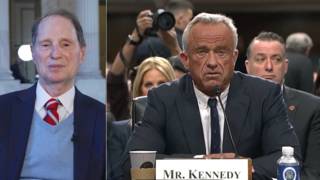
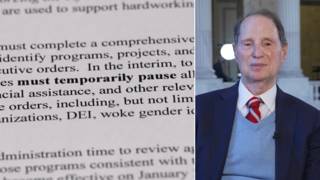
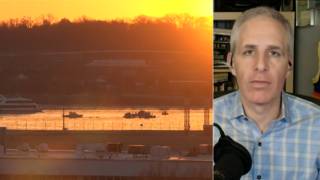
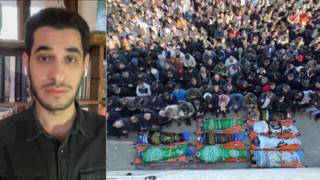






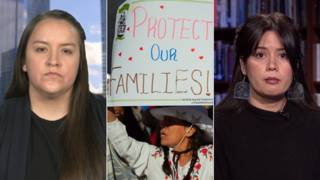
Media Options